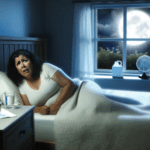Introduction to Menopause and Rhinorrhea
Menopause marks a significant transition in a woman’s life, typically occurring in the late 40s to early 50s, signifying the end of menstrual cycles and reproductive years. This natural biological process is characterized by the cessation of ovarian function and a decline in the production of hormones, particularly estrogen and progesterone. Symptoms associated with menopause can vary widely among individuals but often include hot flashes, night sweats, mood changes, and sleep disturbances. Understanding the complexities of menopause is crucial as it can impact various aspects of health, including the respiratory system.
Defining Rhinorrhea (Runny Nose)
Rhinorrhea, commonly known as a runny nose, is a condition where there is an excess drainage of a fluid-like substance from the nasal cavity. This discharge can be clear or mucoid and may be a result of various causes such as infections, allergies, or environmental irritants. Rhinorrhea is not only a symptom of common colds or allergic reactions but can also be associated with other health conditions, including hormonal changes during menopause.
Overview of Menopause-Related Rhinorrhea
During menopause, the body undergoes numerous physiological changes, including hormonal fluctuations that can affect the mucous membranes lining the nasal passages. A decrease in estrogen levels can lead to the drying out of these membranes, resulting in increased mucus production as the body attempts to compensate for the dryness. This can lead to nasal congestion and rhinorrhea. Additionally, the immune system may become weakened during menopause, making women more susceptible to sinus infections and conditions like allergic rhinitis. Menopause hormone therapy (MHT) has been associated with non-allergic rhinitis, indicating a potential link between hormone treatments and nasal symptoms.
Furthermore, studies have shown that menopausal women may experience a higher prevalence of general rhinitis symptoms, including rhinorrhea or posterior nasal drip. While the exact mechanisms are not fully understood, it is clear that menopause can have a significant impact on nasal health and comfort. Recognizing the connection between menopause and rhinorrhea is essential for managing symptoms effectively and improving the quality of life for those going through this transitional phase.
Physiological Changes During Menopause
Hormonal Fluctuations and Their Effects
Menopause marks the end of a woman’s reproductive years, characterized by the cessation of menstruation. This transition is driven by hormonal fluctuations, particularly the decline in estrogen and progesterone production by the ovaries. These hormonal changes can lead to a variety of symptoms, including hot flashes, mood swings, and sleep disturbances. Estrogen, in particular, has a systemic impact, affecting not just the reproductive system but also other bodily functions, including the regulation of nasal mucosa and respiratory function.
Impact on Nasal Passages
The decline in estrogen levels during menopause can lead to physiological changes in the nasal passages. Estrogen is known to influence the structure and function of the nasal mucosa, and its reduction can result in atrophic changes. These changes may manifest as a thinning of the nasal mucosa, decreased glandular secretion, and alterations in blood flow, leading to symptoms such as nasal dryness, crusting, and a sensation of nasal congestion. Additionally, the reduction in estrogen can disrupt the normal regulation of nasal mucus production, potentially leading to a runny nose or rhinorrhea.
Estrogen and the Immune System
Estrogen also plays a role in modulating the immune system. During menopause, the decreased levels of estrogen can lead to an altered immune response, which may affect the nasal mucosa’s ability to defend against pathogens and allergens. This altered immune response can exacerbate inflammatory processes in the nasal passages, contributing to chronic rhinitis symptoms. Furthermore, the changes in immune function may increase the susceptibility to respiratory infections and the development of new allergies, which can further aggravate nasal symptoms during menopause.
In summary, menopause brings about significant hormonal changes that can have a direct impact on the nasal passages and respiratory health. Understanding these physiological changes is crucial for managing menopause-related rhinorrhea and ensuring the well-being of women going through this transition.
Allergies, Histamines, and Menopause
Allergy Worsening During Menopause
For many women, menopause is a time of significant change, not only in terms of reproductive health but also in overall well-being. Allergies, which are immune system responses to perceived threats from substances like pollen or pet dander, can become more pronounced during this time. Dr. Alyssa Dweck, Bonafide Chief Medical Officer, notes that allergic diseases affect women disproportionately, and changes in estrogen levels during menopause can exacerbate allergy symptoms such as rhinorrhea (runny nose) and itchy eyes. This is due to the presence of estrogen receptors on immune-regulating cells, which, when bound by estrogen, can lead to increased histamine release and thus stronger allergic reactions.
Histamine Production and Menopause
Histamines are chemicals that play a crucial role in the body’s immune response to allergens. During menopause, fluctuations in hormone levels, particularly estrogen, can affect histamine production. High or low levels of estrogen can alter how immune cells respond to allergens, potentially leading to increased histamine release and more severe allergy symptoms. Additionally, estrogen can influence inflammation in the airways, which may worsen respiratory allergies or asthma, a condition that many women find intensifies during menopause.
Understanding Hormonal Rhinitis
Hormonal rhinitis is a condition where hormonal fluctuations lead to nasal congestion and rhinorrhea. It is not as widely recognized as other menopausal symptoms, but it can significantly impact quality of life. During perimenopause and menopause, progesterone levels, which typically counterbalance estrogen’s effects on the body’s allergic response, are lower. This imbalance can contribute to the worsening of allergy symptoms. Women may experience new onset or increased sensitivity to allergens, leading to symptoms like sneezing, congestion, and a runny nose, which are often mistaken for a cold but are actually allergic responses.
Understanding the link between menopause, hormones, and allergies is crucial for managing symptoms effectively. While more research is needed to fully comprehend this relationship, it is clear that hormonal changes during menopause can influence the immune system and exacerbate allergic reactions. Women going through menopause are encouraged to monitor their allergy symptoms and consult healthcare providers for personalized management strategies.
Natural Remedies for Managing Menopause-Related Rhinorrhea
Herbal Teas and Their Benefits
During menopause, many women experience an increase in rhinorrhea, commonly known as a runny nose. One natural approach to managing this symptom is the consumption of herbal teas. Herbal teas such as chamomile, peppermint, ginger, stinging nettle, and butterbur have properties that may help alleviate nasal congestion. These teas contain anti-inflammatory and antihistamine elements, which can soothe irritated nasal passages and reduce mucus production. The warmth of the tea also provides steam, which can help open airways and offer relief.
Steam Inhalation Techniques
Steam inhalation is a simple yet effective home remedy for a runny nose. It involves breathing in steam from a bowl of hot water, which can help loosen mucus and clear the nasal passages. For added benefit, a few drops of essential oils such as eucalyptus or peppermint can be added to the water. The process should be done with caution to avoid burns, typically for about 10 to 20 minutes.
Essential Oils and Their Usage
Essential oils can play a supportive role in managing menopause-related rhinorrhea. Oils such as eucalyptus, rosemary, and tea tree oil have properties that may help reduce nasal congestion when inhaled. They can be used in steam inhalation, added to a diffuser, or a few drops can be placed on a handkerchief to be inhaled throughout the day.
Menthol and Gentle Blowing Techniques
Applying a menthol rub below the nose can create a cooling sensation that eases breathing. It’s important to use menthol products sparingly to avoid skin irritation. When it comes to clearing the nasal passages, gentle blowing is recommended. Forceful blowing can push mucus into the ear passages and cause infections. Instead, blow one nostril at a time, using a soft tissue to minimize irritation.
Alternative Absorption Methods
For those who find constant blowing uncomfortable, alternative absorption methods can be used. Inserting a small piece of soft tissue into each nostril can help absorb excess mucus. This method is discreet and can be particularly useful when sleeping or unable to blow the nose.
These natural remedies offer a range of options for managing menopause-related rhinorrhea. While they can provide relief, it’s important to consult with a healthcare provider if symptoms persist or worsen.

Bette 100% All-Natural Relaxing Lavender Body Lotion.
Chemical-Free
Your relaxing night time body moisturizer to leave the day’s stress behind. Decompress and wish your body good night with the calming scent of lavender.
When to Seek Medical Attention
Identifying Serious Symptoms
While a runny nose during menopause is often a benign symptom associated with hormonal changes, there are instances when it may signal a more serious condition. It is important to be vigilant and recognize when symptoms are not just a nuisance but a potential health concern. Seek medical attention if you experience:
- Persistent symptoms: A runny nose that lasts for weeks or even months without improvement.
- Accompanying fever: This could indicate an infection such as sinusitis.
- Difficulty breathing: If you find it hard to breathe or experience wheezing, it could be a sign of asthma or another respiratory condition.
- Facial pain or headache: Pain in the sinuses can be a sign of inflammation or infection.
- Discolored nasal discharge: Yellow or green mucus can indicate a bacterial infection.
- Blood in nasal discharge: While occasionally a small amount of blood is not unusual, frequent or heavy bleeding warrants medical evaluation.
Additionally, if you have underlying health conditions, such as immune disorders, that could be exacerbated by a runny nose, it is advisable to consult with your healthcare provider.
Understanding When Rhinorrhea Is a Concern
Rhinorrhea, or a runny nose, is typically not a cause for alarm. However, understanding when this symptom is a concern can help you decide when to seek medical advice. It’s not just the severity of the runny nose, but the context and associated symptoms that matter. For instance:
- New onset of allergies: Developing new allergies or a sudden worsening of existing allergies during menopause can be a cause for concern and may require medical intervention.
- Non-responsive to home remedies: If natural remedies or over-the-counter medications do not alleviate your symptoms, it may be time to consult a healthcare professional.
- Impact on quality of life: When a runny nose is affecting your sleep, daily activities, or causing embarrassment, it is important to seek help.
Remember, while menopause-related rhinorrhea is often due to hormonal fluctuations, it can sometimes be a symptom of other conditions that require treatment. If you are unsure about your symptoms or if they persist despite your best efforts at home management, do not hesitate to reach out to your healthcare provider. They can help you narrow down the cause and determine the best approach to your treatment, ensuring that you maintain your health and well-being during this phase of life.
By the way, something for you, a little gift!!!
I am just in the middle of publishing my book. It’s about How women can balance their hormones. One part is about food and diet, of course.
Follow this link and enter your email.
I will send you this part of the book for free once the book is published. It has many concrete, practical tips and recipes and will help you feel better during menopause or times of Big hormonal fluctuations.
Annette, Damiva Lead for Health & Wellness

Preventive Measures and Lifestyle Adjustments
Dietary Considerations
During menopause, the body undergoes significant hormonal changes that can impact overall health, including the immune system. To support the body’s natural defenses and potentially reduce the incidence of menopause-related rhinorrhea, it is crucial to maintain a balanced and nutritious diet. Incorporating a variety of fruits, vegetables, lean proteins, and whole grains can provide essential vitamins and minerals. Calcium and vitamin D are particularly important for bone health, which can be compromised during menopause. Additionally, staying hydrated by drinking plenty of water can help maintain mucosal health in the nasal passages. Limiting intake of caffeine and alcohol, which can disrupt sleep patterns and contribute to dehydration, is also advisable.
Environmental Factors and Allergen Avoidance
Environmental triggers can exacerbate rhinorrhea, especially for those experiencing heightened sensitivity during menopause. To minimize exposure to allergens, it is beneficial to keep the living environment clean by regularly dusting, vacuuming, and changing air filters. Using hypoallergenic bedding and avoiding pets in the bedroom can also reduce allergen exposure. During high pollen seasons, keeping windows closed and using air purifiers can help. It’s also important to be mindful of indoor humidity levels, as both overly dry and overly humid conditions can irritate nasal passages.
Stress Management and Its Role
Stress can have a profound impact on menopausal symptoms, including rhinorrhea. Engaging in regular stress-reduction techniques such as mindfulness, meditation, or yoga can help manage stress levels. Cognitive Behavioral Therapy (CBT) has been shown to provide coping strategies for managing menopause-related anxiety and stress, which in turn may alleviate physical symptoms. Establishing a consistent sleep routine and creating a sleep-conducive environment by minimizing light and noise can also improve sleep quality, thereby reducing stress and its physical manifestations.
By adopting these dietary, environmental, and stress management strategies, women can take proactive steps to not only manage menopause-related rhinorrhea but also enhance their overall well-being during this transitional phase of life.

From unhappy, dry, and sandpaper to silky, smooth and feeling good. That’s Cleo. Cleo is a 100% natural labial balm to moisture and soothe “your other lips”. Cleo is chemical-free, water-free, pH optimized and helps maintain and restore your delicate labial skin’s natural flora. Ideal for daily use or as needed. Get the most silky, lovable lips ever.
Conclusion: Embracing Menopause and Managing Symptoms
Summary of Key Points
Throughout this article, we have explored the multifaceted relationship between menopause and rhinorrhea, a condition more commonly known as a runny nose. We’ve delved into the physiological changes that occur during menopause, including hormonal fluctuations and their effects on the body, particularly the nasal passages and the immune system. The role of estrogen in these changes has been a focal point, as it significantly impacts the mucous membranes and can lead to symptoms like a runny nose.
We also discussed how menopause can exacerbate allergies and the production of histamines, leading to what is sometimes referred to as hormonal rhinitis. This condition can be particularly challenging for women going through menopause, as it adds to the array of symptoms they may already be experiencing.
In terms of management, we’ve highlighted several natural remedies that can help alleviate menopause-related rhinorrhea. These include herbal teas, steam inhalation, the use of essential oils, menthol, and gentle blowing techniques. We’ve also touched upon when it’s appropriate to seek medical attention and the importance of preventive measures and lifestyle adjustments, such as dietary considerations, allergen avoidance, and stress management.
Empowerment Through Knowledge and Self-Care
Understanding menopause and its symptoms is the first step toward empowerment. With knowledge comes the ability to make informed decisions about one’s health and well-being. It’s crucial for women to recognize that menopause is a natural life stage and not a deficiency or a condition that necessarily requires medical treatment. This perspective can help shift the narrative from one of loss to one of transition and growth.
Self-care during menopause is not just about managing symptoms but also about embracing the changes and finding balance. Women are encouraged to explore and find what works best for their bodies and lifestyles. This might mean incorporating relaxation techniques, engaging in regular physical activity, or seeking support from healthcare providers when necessary.
By taking charge of their health and well-being, women can navigate menopause with confidence. It’s about celebrating the strength and beauty of this phase of life and recognizing the achievements of women as they age. Positive role models and open discussions can help to reduce stigma and encourage a more positive experience of menopause.
In conclusion, menopause is a time of change, but it doesn’t have to be a negative experience. With the right knowledge and self-care strategies, women can manage symptoms like rhinorrhea and embrace this new stage of life with optimism and grace. By understanding the changes happening in their bodies and taking proactive steps to maintain their health, women can continue to lead vibrant, fulfilling lives during menopause and beyond.








